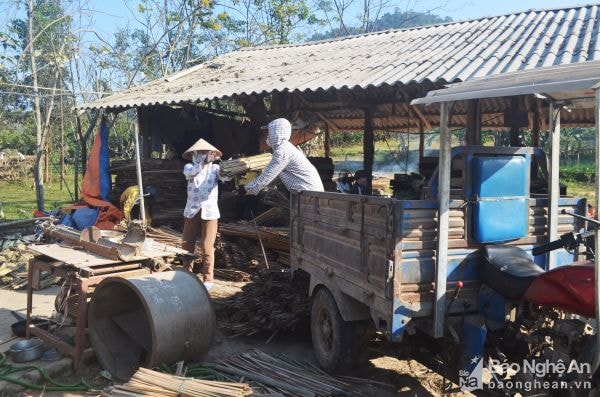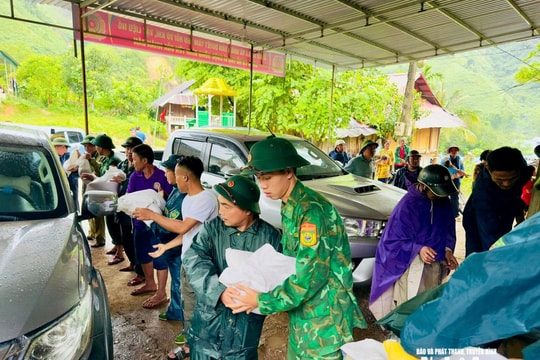Cooperatives can borrow unsecured loans for business.
“Recent practice shows that cooperatives not only help people escape poverty but also help members get rich,” according to Deputy Prime Minister Vuong Dinh Hue. In the near future, the Government will issue a set of policies to support and attract businesses and economic sectors to invest in agriculture and rural areas, allowing cooperatives to borrow unsecured loans with effective business plans.
On the morning of July 7 in Da Lat City, Deputy Prime Minister Vuong Dinh Hue, Head of the Steering Committee for Innovation and Development of Collective Economy, chaired a conference to review 5 years of implementing the 2012 Law on Cooperatives in the agricultural sector of the South Central Coast and Central Highlands.
| Deputy Prime Minister Vuong Dinh Hue speaks at the Conference. Photo: VGP/Thanh Chung |
The conference was organized by the Ministry of Agriculture and Rural Development (MARD) and is the final regional review conference to prepare for the national online conference to review the Law chaired by the Prime Minister, which will take place in 2 months.
In general, the South Central Coast has 1 union and 624 new-style agricultural cooperatives, with each province establishing an average of 4 new cooperatives in the past 5 years, much lower than the national average. In the Central Highlands, there are 2 unions and 155 new-style cooperatives, with each province having an average of about 7 newly established cooperatives after the 2012 Cooperative Law took effect.
The average operating capital of each cooperative in these two regions is 2.1 billion VND, higher than the national average (1.1 billion VND). However, because the rate of cooperative linkage with enterprises is low, only 16.5% of cooperatives have linkages, so the selling price of products is only 2/3 of the actual price.
Overviewing the organization and operation of cooperatives, Deputy Minister of Agriculture and Rural Development Tran Thanh Nam said that cooperatives in the South Central Coast region have small production scale but a large number of members, an average of 800 members/cooperative, while in the Central Highlands region, the organization is more suitable when each cooperative has few members but a very large scale of operation, providing both input and output services and organizing agricultural production on a large area.
| In particular, representatives of cooperatives also expressed their joy that in the near future, the Government will issue a set of policies to support and attract businesses and economic sectors to invest in agriculture and rural areas, allowing cooperatives to borrow unsecured loans with effective business plans, mortgage greenhouses and net houses to borrow bank capital to reinvest in production and business and participate in preferential loans to invest in high-tech agricultural production according to the guidance of the Ministry of Agriculture and Rural Development or the Ministry of Science and Technology. |
At the conference, leaders of provinces and cities in the region and Directors and Chairmen of the Board of Directors of cooperatives recognized that new-style cooperatives that value voluntary association of households will open up a direction for sustainable production, linking production with consumption. In fact, many new-style cooperative models such as Hoa Mat Troi, Tan Tien... in Lam Dong that Deputy Prime Minister Vuong Dinh Hue visited yesterday have been successful for decades.
Directors of cooperatives in the region also believe that there is still much room for these successfully operating cooperatives to achieve more success by removing policies on credit, land, attracting human resources, training management and administration skills for cooperative staff, and consolidating and perfecting the functions and tasks of state management of cooperatives of state agencies...
 |
| Produced at Que Son bamboo processing cooperative, Que Phong district. Photo courtesy of Thanh Duy |
Deputy Prime Minister Vuong Dinh Hue said that new-style cooperatives play an important role in reorganizing commodity production, especially in the agricultural sector, but for many years, this model has not been effective in the market economy. Despite its great role, currently, cooperatives in all sectors only contribute 5% to the country's economic growth.
In the South Central Coast and Central Highlands regions - where there are many natural conditions for agricultural development, the Deputy Prime Minister said that the number of cooperatives is still very small although there are many good models, but they are unevenly distributed, mainly in Lam Dong, Dak Lak, and Quang Ngai. "By visiting cooperatives such as Hoa Mat Troi, Tan Tien..., we see that the activities of cooperatives are very professional and modern. This reality shows that cooperatives not only help people escape poverty but also help cooperative leaders and members get rich right in their homeland," said the Deputy Prime Minister.
The lesson for the policy of developing cooperatives to come into life, according to Deputy Prime Minister Vuong Dinh Hue's suggestion, is that the only thing that the Secretary and Chairman of the Provincial People's Committee must do is to resolutely direct implementation at the grassroots level. Accordingly, strengthen communication and propaganda for society and even state management officials about the significance of the collective economy, focusing on the new type of cooperatives, considering this as the solution of all solutions for developing cooperatives.
| Overview of the Conference. Photo: VGP/Thanh Chung |
The Deputy Prime Minister said that the collective economy is an inevitable production method in Vietnam's "asymmetric" market economy. "Input material markets have few sellers and many buyers, so prices are forced down, while output markets have many sellers and few buyers, and the losses fall on farmers. Therefore, it is necessary to let people see the voluntary connection between farming households, between production households and enterprises and the market. That is an inevitable law that needs to be widely communicated and disseminated to all subjects," said Deputy Prime Minister Vuong Dinh Hue.
The Head of the Steering Committee also assigned ministries and branches to focus on immediately removing difficulties for cooperative activities such as completing conversion registration, resolving dissolution and bankruptcy procedures for cooperatives that have ceased operations to create conditions for the establishment of new-style cooperatives... Amending legal documents to create conditions for capital, land (headquarters, production land), and credit for cooperatives to operate...
Localities are interested in allocating budget to build a local collective economic development fund when the Deputy Prime Minister said that bad debt in agricultural production and poverty reduction is very low, investment in the collective economy only brings profit, not loss.
The Deputy Prime Minister requested state management agencies of cooperatives in localities in the region to actively advise Party committees and authorities to issue specific, practical policies to develop the collective economy and cooperatives in the area.
Thanh Chung








